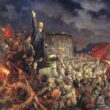Above: Haiti’s Jimmy “Barbecue” Chérizier, who’s leading the country’s mass anti-imperialist revolt
The end goal of our ruling class is to transform the United States into Haiti, making the population here lumpenized to the same extent that Haiti’s is. The U.S. working class has already been de-industrialized, and much of its former “middle class” has been pushed into the status of working poor. The next step is to make millions more of them unemployed or underemployed, creating a situation which parallels that of “Fourth World” countries like Haiti.
When a society has been economically destroyed to the extent that Haiti’s has, much of that society’s population will turn to crime out of necessity, making them part of the lumpenproletariat. Those within the U.S. proletarian movement must therefore adopt a synthesis; one which acclimates us to organizing communities which have in great part been forced out of the working class.
While undertaking this task, we must reconcile two crucial realities about the conditions we’re navigating: 1) that we cannot win the class war without organizing the lumpen, and 2) that such an organizing project cannot be led by the reactionary elements of the lumpen. The communist Bruce Franklin observed that there is “both the danger of tailing after the lumpenproletariat’s existing values and lifestyles, and the necessity of conscious leadership for the lumpenproletariat to assert their own liberation through revolutionary struggle. Of all classes, this may be the one that most needs to be led by conscious revolutionaries with a sense of their historical condition and an awareness of their weaknesses and instability. It would be a mistake, probably a fatal mistake, to think that the only peoples qualified to lead them are individuals just as unpredictable and as lacking in ideology.”
Henry Winston also warned of such an error, responding to the ideas the Black Panther Party had put forth about the lumpenproletariat being the vanguard:
For ways in which the ruling class can manipulate the lumpen elements, we need only refer to the Panthers’ own experience with George Sams, who was used to frame Bobby Seale, Ericka Huggins and others. And we should remember that a white lumpen individual was used to assassinate Martin Luther King, while black ones were recruited to murder Malcolm X. And we should also recall the German monopolists’ manipulation of Van der Lubbe to frame Georgi Dimitrov as part of their drive to launch a genocidal war for world domination. The Cleaver-Newton theory of the lumpenproletariat as vanguard would mean objective surrender to the ruling class because only the working class can lead the fight against poverty and exploitation. And not only does this theory fail to offer an offensive strategy for liberation; without working-class leadership of the struggle, the lumpen victims themselves will not be provided with even their own barest needs.
An effective program for bringing the lumpen into the class struggle does not look like romanticizing the criminal lifestyle. That type of mindset leads revolutionary groups to descend into criminality, as has happened to the Shining Path or the Naxalites. The “lumpen as vanguard” notion comes from a fallacy in thinking. If we want to successfully mobilize the U.S. masses in the era of lumpenization, we’ll need to look to figures like Haiti’s Jimmy Barbecue, who’s brought the country’s lumpen towards a point where they can feasibly defeat neo-colonialism.
The imperialist media portrays BBQ as a gang leader, but this story leaves out a much larger context: that BBQ is responsible for leading a popular revolutionary movement, of which the gangs are just one part. The gangs aren’t the vanguard of this movement. They’ve only been united due to the successes of a larger mass effort; an effort that’s brought great material gains to Haiti’s people, even amid all the economic limitations the imperialists have imposed upon it.
In the territories controlled by BBQ’s forces, there’s a collective project to bring education to the children, rather than letting them go without school and get recruited by the pro-government lumpen elements. As BBQ has explained, this is an early stage in the movement’s project to make Haiti develop on its own. The rebel-controlled neighborhoods have cultivated a sense of safety, even as a war unfolds nearby. They’ve kicked out the corrupt police, who used to shoot at unarmed people with impunity. And that BBQ has unified the gangs means the potential for violence has been greatly reduced.
For all practical purposes, BBQ is constructing an anti-imperialist state; one which is already highly advanced, in the sense that it largely functions without the traditional governmental structures. The communities within the liberated zones don’t need the aid of the government that oppressed them; now the people take care of themselves. This is something relatively close to the end goal of communism, where the state has withered away after society’s old contradictions have been overcome.
The lesson from this is that when you organize around meeting the needs of the people, the lumpenproletariat will unify with you. As Franklin concluded upon observing the stories of U.S. lumpen groups which have joined the class struggle: “The Young Patriots and Young Partisans have shown that these people are capable of becoming not only revolutionaries but revolutionary leaders. And the only way for them to do this, as both groups have shown, is by organizing around the principle of serving the most oppressed and exploited people in American society.” This transformative process cannot happen on its own. It’s interdependent with the construction of an org that’s separate from these lumpen formations, but is capable of bringing these formations into a wider mass movement. That’s what BBQ’s gang unification success has shown.
For us in the United States to do the equivalent of what BBQ has done, though, we’ll need to avoid the errors which have led to past failures at lumpen organizing in this country. When Rodolfo “Cheyenne” Cadena of the Mexican Mafia attempted to unite California’s gangs, the Mafia’s rivals in Nuestra Familia murdered him in prison, catalyzing a new cycle of retaliations. Cheyenne had been connected to the communist movement, working with the Black Panthers and the Brown Berets; but he couldn’t achieve the inter-gang unity that BBQ’s revolutionary movement has. This was because unlike BBQ, Cheyenne didn’t have the kind of institutional power that can actually unite gangs, and thereby overcome a crucial hurdle towards organizing the lumpen.
Such an effort can only succeed when you’ve built a popular movement beyond the gangs; which you can only do when your actions are oriented around advancing the people’s interests. And there is a contradiction between the interests of the gangs and the interests of the wider masses, including most of the lumpen masses. The gangs are based within self-interest, which is why the intelligence centers have been able to weaponize them. As we build our country’s workers movement, we must be vigilant of any efforts to use the gangs for attacking us, like they were used to sabotage Cheyenne’s project. Capitalism has cultivated innumerable types of social forces that are opposed towards popular revolution, and we can’t be naive about the threats which could come from these forces.
Should we keep our cadres secure, though, and continue building this movement, a U.S. parallel to BBQ will emerge. In the last year alone, the U.S. communist movement has exponentially expanded its initiatives to materially aid the people, and it’s going to gain a proportional amount of mass support; when you look at the feed of the American Communist Party’s official account, almost every other statement is about how the party’s members have been assisting their communities. If we keep building on this progress, the people will gain the tools for workers revolution, even as our ruling class acts to lumpenize them. Because when a workers party takes power, it will be able to bring the lumpenized masses back into the working class, constructing a new economic infrastructure in place of the one which capitalism destroyed.
————————————————————————
If you appreciate my work, I hope you become a one-time or regular donor to my Patreon account. Like most of us, I’m feeling the economic pressures amid late-stage capitalism, and I need money to keep fighting for a new system that works for all of us. Go to my Patreon here.
To keep this platform effective amid the censorship against dissenting voices, join my Telegram channel.








